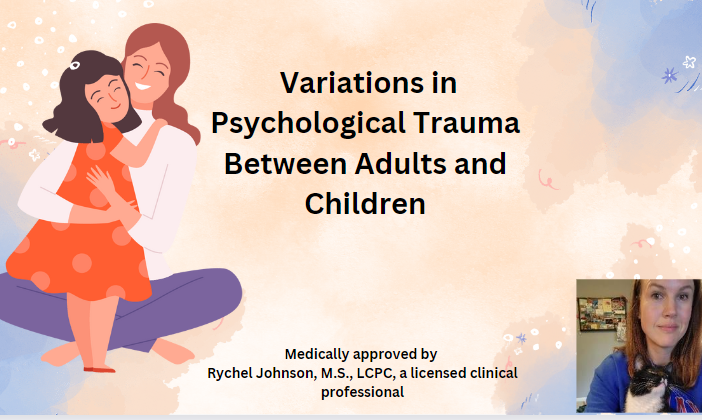Exploring the Variations in Psychological Trauma Between Adults and Children

Psychological trauma can have profound effects on individuals, regardless of age. However, there are distinct differences in how trauma manifests and is experienced between adults and children. Understanding these differences is crucial for effective intervention and support.
Contents
Defining Psychological Trauma
Psychological trauma refers to an emotional response to a distressing event or series of events that overwhelms an individual’s ability to cope. Traumatic experiences can range from natural disasters and accidents to abuse, violence, and loss. The effects of trauma may manifest in various ways, including flashbacks, nightmares, anxiety, depression, and difficulty trusting others.
Psychological Trauma in Adults
- Psychological trauma in adults often stems from various sources, including abuse, neglect, violence, accidents, natural disasters, and combat. Adults may experience symptoms such as flashbacks, nightmares, emotional numbness, avoidance behaviour, hypervigilance, and difficulty regulating emotions. Trauma may also manifest as conditions like post-traumatic stress disorder (PTSD), depression, anxiety disorders, and substance abuse.
Trauma Test
- Assessing trauma in adults involves various psychological assessments and diagnostic tools, such as trauma symptom inventories, structured clinical interviews, and self-report measures. This trauma test helps clinicians evaluate the severity of trauma symptoms and tailor treatment plans accordingly.
Psychological Trauma in Children
- Children are particularly vulnerable to psychological trauma due to their developmental stage and dependency on caregivers. Trauma in children can result from abuse, neglect, domestic violence, accidents, medical procedures, parental separation, or witnessing traumatic events. Children may exhibit symptoms such as nightmares, bedwetting, regression, separation anxiety, behavioural problems, emotional dysregulation, and impaired social relationships.
Impact on Development
- Psychological trauma can disrupt a child’s development and have long-term consequences on their physical, emotional, cognitive, and social well-being. Trauma during childhood may impair brain development, affect academic performance, hinder social skills development, and increase the risk of mental health disorders later in life.
How to Stop Worrying? For individuals struggling with worry and anxiety related to trauma, various strategies and interventions can help:
- Cognitive-behavioral therapy (CBT): CBT techniques can help individuals identify and challenge negative thought patterns and develop coping skills to manage anxiety and worry.
- Mindfulness and relaxation techniques: Practices such as mindfulness meditation, deep breathing exercises, and progressive muscle relaxation can promote relaxation and reduce anxiety symptoms.
- Social support: Connecting with supportive friends, family members, or support groups can provide validation, encouragement, and a sense of belonging.
- Professional help: Seeking guidance from mental health professionals, such as therapists or counsellors, can provide tailored support and treatment for trauma-related concerns.
Resilience and Recovery
- Despite the challenges posed by psychological trauma, both adults and children have the capacity for resilience and recovery. With appropriate support, understanding, and interventions, individuals can learn to cope with trauma, build resilience, and lead fulfilling lives.
Treatment Approaches
- Treating trauma in adults and children may require tailored approaches that address their unique needs and developmental stages. Trauma-focused therapy, play therapy, and family therapy are among the evidence-based interventions used to help individuals heal from traumatic experiences. Medication may also be prescribed to manage symptoms such as anxiety and depression.
Conclusion
While psychological trauma can impact individuals of all ages, there are distinct differences in how it manifests and affects adults versus children. By recognizing these differences and implementing appropriate interventions, we can better support individuals affected by trauma and promote healing and resilience.




